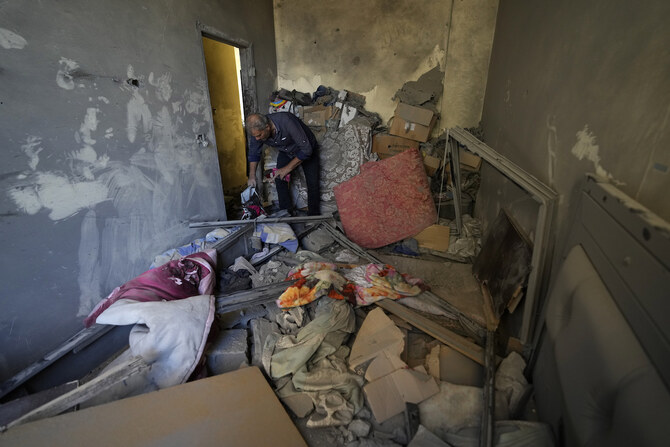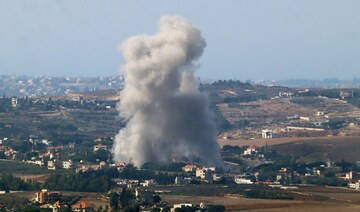BEIRUT: Israeli military operations against Lebanon escalated on Wednesday.
The Israeli military resumed airstrikes on the southern suburbs of Beirut after a week-long pause. The number of casualties from the airstrike targeting a building in Barja on Tuesday night rose to 30, including children and women.
Additionally, an airstrike on Wednesday resulted in the deaths of eight civilians in the town of Al-Ain in the Baalbek region. The airstrikes also affected the cities of Baalbek and Hermel, causing significant destruction, particularly in the areas of Zahrani and Nabatieh.
A devastating airstrike on a residential building in Al-Shahabiya claimed five lives, while emergency teams recovered seven bodies from rubble in Byout Al-Saiyad following an overnight bombardment. Civil defense crews continue searching for survivors for a second day.
In Al-Burghliyeh, a two-phase attack on a building and vehicle left three dead and seven wounded, with three additional fatalities reported near Al-Abbasiyeh.
Breaches of the sound barrier were recorded in the southern regions, extending to the southern suburbs of Beirut. Reconnaissance aircraft flew at low altitudes over Lebanese airspace, particularly concentrated above the Port of Beirut. This left the population with a sense of being under constant surveillance and that they might be potential targets.
An Israeli hot air balloon flew for the first time, accompanied by drones in the skies over the villages of Baalbek District toward the eastern mountain range of Lebanon.
The caretaker prime minister, Najib Mikati, during a session of the Council of Ministers, strongly condemned the “ongoing Israeli war on Lebanese territory and its escalation, which has turned into crimes against humanity.” He said that “Israel disregards all international efforts to establish a ceasefire.”
“Israel continues to destroy towns, villages and essential facilities, including hospitals and places of worship,” Mikati said. “It also continues to kill civilians, assassinate members of the Lebanese army and target UNIFIL forces, and medical and relief personnel, in a clear violation of international law. Lebanon adheres to its right to preserve its dignity and national sovereignty, and will not hesitate to confront any Israeli violation or aggression.”
Mikati congratulated the American people on their “exercise of democracy following the preliminary results of the US presidential elections.” He said that “the primary pathway to any acceptable solution for Lebanon was the complete cessation of Israeli aggression, the implementation of Resolution 1701, and the election of a president, which would facilitate the restoration of stability and the activation of national institutions.”
Meanwhile, the secretary-general of Hezbollah, Sheikh Naim Qassem, said that the party “does not rely on the American elections, whether Harris succeeds or Trump prevails; this holds no significance for us,” emphasizing that Israeli Prime Minister Benjamin Netanyahu “cannot win.”
In his second televised appearance since he was appointed as Hezbollah’s secretary-general, Qassem said: “This Israeli war of aggression can only be stopped by one thing; the battlefield. This is not a war Israel will win, and Israel must know that all resistance fighters are prepared for martyrdom.” He added: “We are not counting on the general political movement or Netanyahu gaining some advantages; we are counting on the battlefield.”
Qassem said: “The Israeli aggression on Lebanon has lasted for a month and ten days, and it no longer matters how it started or what pretexts were used.
“Israel has exceptional air capabilities, therefore, it controls the skies, along with the communications network, giving it significant power, especially since this capability is also backed by the endless support of America, ‘The Greatest Satan.’”
However, he said that “Hezbollah’s resources are available, whether in storage, places of positioning or by various means.”
On Wednesday, Saudi Ambassador to Lebanon Walid Bukhari conveyed to Lebanese Army Commander Gen. Joseph Aoun “the Kingdom’s support for the military institution.”
Meanwhile, internal political tensions escalated as Lebanese leaders voiced opposition to Iranian influence.
MP Camille Chamoun, addressing the Sovereign Front, linked Lebanon’s current crisis to years of Iranian intervention.
“Lebanon is not a battlefield for others,” Chamoun said, making a pointed appeal to the Shiite community to prioritize national interests. “We want to rebuild this country without foreign intervention and elect a president, ” he said.
The Maronite Bishops Council, meeting under Patriarch Bechara Al-Rahi, expressed dismay at “the magnitude of catastrophe that has befallen Lebanon, resulting in numerous casualties and widespread destruction across villages, towns, and cities in the southern suburbs, South Lebanon, Bekaa, and other Lebanese regions.”
The Maronite bishops demanded immediate diplomatic action to end the Hezbollah-Israel conflict and implement UN Resolution 1701. They condemned recent Israeli operations, including a naval raid in Batroun that resulted in the abduction of a Lebanese citizen.
The council emphasized the urgent need for a ceasefire, pointing to the critical conditions faced by displaced residents who lacked adequate protection from harsh weather conditions.
























